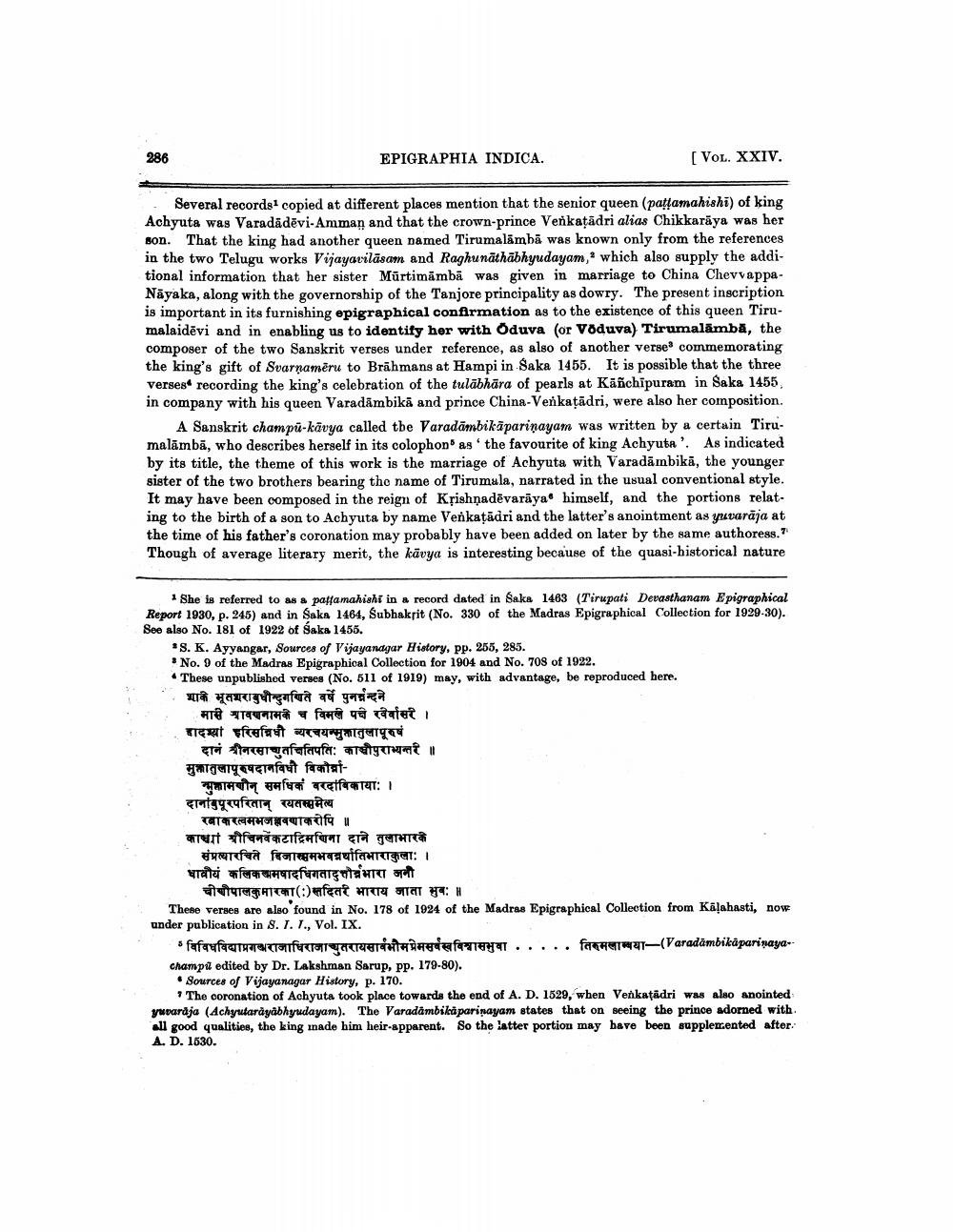________________
286
EPIGRAPHIA INDICA.
Several records1 copied at different places mention that the senior queen (paṭṭamahishi) of king Achyuta was Varadadevi-Amman and that the crown-prince Venkaṭādri alias Chikkaraya was her son. That the king had another queen named Tirumalamba was known only from the references in the two Telugu works Vijayavilāsam and Raghunathābhyudayam, which also supply the additional information that her sister Murtimamba was given in marriage to China ChevvappaNayaka, along with the governorship of the Tanjore principality as dowry. The present inscription is important in its furnishing epigraphical confirmation as to the existence of this queen Tirumalaidēvi and in enabling us to identify her with Öduva (or Vöduva) Tirumalamba, the composer of the two Sanskrit verses under reference, as also of another verse3 commemorating the king's gift of Svarnamēru to Brahmans at Hampi in Saka 1455. It is possible that the three verses recording the king's celebration of the tulabhāra of pearls at Kanchipuram in Saka 1455. in company with his queen Varadambika and prince China-Venkatadri, were also her composition.
[VOL. XXIV.
A Sanskrit champü-kavya called the Varadambikaparinayam was written by a certain Tirumalamba, who describes herself in its colophon' as the favourite of king Achyuta'. As indicated by its title, the theme of this work is the marriage of Achyuta with Varadāmbika, the younger sister of the two brothers bearing the name of Tirumala, narrated in the usual conventional style. It may have been composed in the reign of Krishnadevaraya himself, and the portions relating to the birth of a son to Achyuta by name Venkatadri and the latter's anointment as yuvarāja at the time of his father's coronation may probably have been added on later by the same authoress." Though of average literary merit, the kavya is interesting because of the quasi-historical nature
1 She is referred to as a patlamahishi in a record dated in Saka 1463 (Tirupati Devasthanam Epigraphical Report 1930, p. 245) and in Saka 1464, Subhakrit (No. 330 of the Madras Epigraphical Collection for 1929-30). See also No. 181 of 1922 of Saka 1455.
S. K. Ayyangar, Sources of Vijayanagar History, pp. 255, 285.
No. 9 of the Madras Epigraphical Collection for 1904 and No. 708 of 1922.
These unpublished verses (No. 511 of 1919) may, with advantage, be reproduced here.
शाके भूतशराबुधौन्दुगणिते वर्षे पुनन्दने
मासे श्रावणनामके च विमले पचे रवेर्वासरे । दादश्यां हरिसन्निधौ व्यरचयन्मुक्तातुलापूरुषं
दानं श्रीनरसाच्युतचितिपतिः काञ्चीपुराभ्यन्तरं ॥ मुक्तातुलापूरुषदानविधी विकौन
मुक्तामणीन् समधिकं वरदाविकायाः । दानां पूरपरितान् रयतरसमेत्य रत्नाकरत्वमभजलवणाकरोपि ॥
arrari श्रचिनवेंकटाद्रिमणिना दाने तुलाभारके संप्रस्थारचिते हिजाममभवन्नर्थातिभाराकुलाः । धावौयं कलिकममषादधिगतादुत्शोभारा जनी
चौपालकुमारका (:) तदितर भाराय जाता भुवः ॥
These verses are also found in No. 178 of 1924 of the Madras Epigraphical Collection from Kalahasti, now under publication in S. I. I., Vol. IX.
* विविधविद्याप्रगल्भराजाधिराजाच्युतरायसार्वभौम प्रेमसर्वस्व विश्वासभुवा
fa-(Varadambikaparinaya-
.....
champi edited by Dr. Lakshman Sarup, pp. 179-80).
Sources of Vijayanagar History, p. 170.
The coronation of Achyuta took place towards the end of A. D. 1529, when Venkatadri was also anointed yuvaraja (Achyutarayabhyudayam). The Varadambikäparinayam states that on seeing the prince adorned with. all good qualities, the king made him heir-apparent. So the latter portion may have been supplemented after. A. D. 1530.




